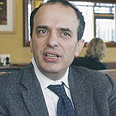
Germany: Rabbi scared to wear kippah
First rabbi to be ordained in Germany since WWII claims there's still fear of anti-Semitism in streets
"It's a fact - it isn't smart to display I'm Jewish. This is a problem and we have to face it," German-born Daniel Alter, 47, told Reuters in an interview.
He is worried about neo-Nazi attacks and says anti-Semitism in Germany - still tortured by memories of the Holocaust in which Nazis wiped out six million Jews - puts the growth of Jewish communities here at risk.
As a Jew he feels unsafe in several German cities, not all in former communist east Germany where the far-right National Democratic Party (NPD) has made electoral gains recently.
Alter, whose father survived Auschwitz concentration camp, dismissed talk in the German media of a possible blossoming of Jewish life in Germany.
Jewish schools, theatres and shops have sprung up but Germany's Jewish communities will never compare to those in Britain or the United States, says Alter, who serves in the northern towns of Oldenburg and Delmenhorst.
"We are building something on the ruins, on the scars left behind but it'll be something different," He said. "I don't think there is any way to bring back the Jewish life and culture we had here. Ever."
That Germany has about four times as many Jews as it did 15 years ago is due to immigrants from the former Soviet Union who account for most of the 105,000 registered Jews, he says.
The rabbi does not expect the number of Jews in Germany to rise much and says anti-Semitism is a factor. "If anti-Semitism grows, people might leave," He said.
The number of far-right offences in Germany, many of which were anti-Semitic, jumped 20 percent in the first eight months of 2006, according to the latest available police data.
Last year activists burned Holocaust victim Anne Frank's diaries and made a teenager wear a sign saying he was a Jew. Many Jewish establishments have police guards and a German all-Jewish football team suffers weekly abuse.
The latest figures prompted Chancellor Angela Merkel this weekend to condemn the rise in right-wing violence and urge Germans to fight it.
New approach needed
But Alter is not interested in statistics.
"I go on how I feel. I might have felt safer 20 years ago. Now the right-wingers dare to claim the streets."
"There is racism and anti-Jewish sentiment all over the world but I have the impression that societies in other countries deal with it differently. We would feel better if
German society changed its approach."
He said society had to show it does not tolerate right-wing extremism and a ban of the NPD could send a signal. Germany already has tough laws against offences such as Holocaust denial and using the Nazi swastika symbol.
The NPD, whose followers have praised some Nazi policies, has seats in three state parliaments and 9,000 members. The NPD says it is a democratic, law-abiding party. Some politicians are pushing again for a ban after an attempt failed in 2003 as some of the testimony came from government informants in the party.
Banning parties, however, is a sensitive subject in Germany which has emphasized tolerance and freedom of speech since 1945.
Alter, born in south Germany, taught at a Jewish school before training at Germany's first rabbi college in Potsdam. He was ordained in Dresden in September along with two
others, one was Czech-born and one who returned to South Africa.
They were the first rabbis to be ordained in Germany since 1942 when the College of Jewish Studies in Berlin was destroyed by the Gestapo, the Nazi's dreaded secret police. Before September, Germany had to import its roughly 25 rabbis who served 100 congregations.
Alter's work involves pastoral care in his communities, which are overwhelmingly Russian, leading services and conducting religious ceremonies - mainly funerals, he says.
He notes how before the 1930s, Germany's 600,000 Jews identified with the country they had lived in for generations and supplied some of its greatest minds.
"Jewish cultural heritage was part of German cultural heritage and Jewish people were German patriots - soldiers who fell in World War One didn't imagine what would happen later."
His parents cannot talk about the Holocaust and Alter's bond with Germany is complex. "Would you identify with a country where much of your family and culture had been wiped out? My dream in the long run is to live in Jerusalem."










